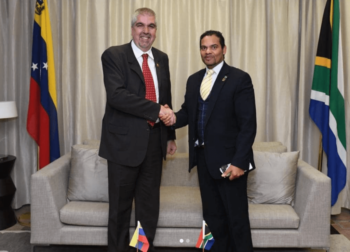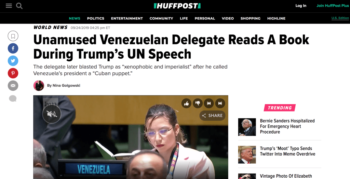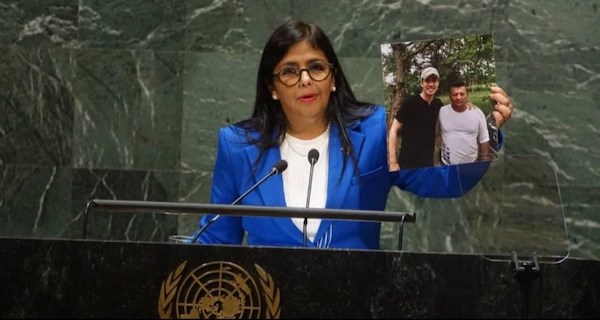Venezuelan Vice President Delcy Rodríguez passed through the doors of the United Nations Headquarters in New York City on the afternoon of September 27 and flashed a smile to reporters waiting near the entrance.
Flanked by Foreign Minister Jorge Arreaza and UN Ambassador Samuel Moncada, Rodríguez raised her arms into the air and waved a photo in her left hand before disappearing up the escalators which lead to the General Assembly hall.
That photo showed the U.S.-backed coup leader Juan Guaidó posing with Colombian narco-paramilitary members from the Los Rastrojos gang, which is notorious for kidnapping, drug smuggling, and murder.
Guaidó had apparently relied on Los Rastrojos to enter Colombia ahead of his failed humanitarian aid stunt on February 23. For the coup leader and his backers in Washington, the images could not have surfaced at a more inconvenient time.
Rodríguez appeared confident as she prepared to address the 74th General Assembly. The Venezuelan team entered the meeting anxious about plans by the United States to escalate its diplomatic war against the country.
Close observers had expected that the U.S. would try to block Rodríguez from speaking as part of its effort to delegitimize her government.
Venezuelan Vice President @DRodriguez_en flashes a photo of US-backer coup leader @jguaido posing with Colombian narco traffickers as she enters the #UNGA
The act was a preview of her General Assembly address, which will begin shortly pic.twitter.com/Lktxh3xNLB
— Anya Parampil (@anyaparampil) September 27, 2019
Yet Rodríguez ultimately appeared at the podium to deliver a jeremiad against U.S. meddling in her country’s affairs and what she called “capitalist violence.”
Her commanding presence at the UN delivered another blow to the Trump administration’s regime-change efforts, and signaled that the majority of the world’s countries still recognized the authority of Venezuela’s elected government.
For months, a clandestine war has been fought in the UN corridors and in capitals around the world, aimed at determining who had the right to define Venezuela’s internationally-recognized government: the Venezuelan people, or the Trump administration.
Since January, the U.S. has pressured countries to revoke Venezuela’s status at the United Nations, converting the international body into a battleground for the country’s sovereignty.
“[Nicolas] Maduro is and will remain the legitimate president of Venezuela, by the people’s sacred right to self-determination,” Rodríguez announced before the General Assembly moments after her arrival.
As Rodríguez took the floor, a modestly sized group of representatives from U.S.-allied countries walked out of the hall, in a display of opposition to her presence. The walk-out recalled scenes from diplomatic meetings from Vienna to Geneva in the months following Washington’s move to recognize Guaidó as Venezuela’s president in January.
The #Maduro regime’s lies & deceit corrupt the @UN charter. We gather to solve the world’s problems, not stand by while Maduro starves the people of #Venezuela. That’s why we joined other nations to walk out of #UNGA74 when Maduro’s crony took the stage. #EstamosUnidosVE pic.twitter.com/vLYaIx8Am0
— U.S. Mission to the UN (@USUN) September 27, 2019
“It was a clear victory because what they were trying to do was not to just get out of the room, or walk away from the speech—what they [wanted] to do was to try and stop the Vice President from speaking—but they didn’t have the strength, they were defeated,” Venezuela’s vice minister for Africa, Yuri Pimentel, told The Grayzone.
“The only thing they could do was walk away,” Pimentel explained. “That’s not a problem for us, the room was really full of delegations and we didn’t even notice when these people went away.”
Nine months since the U.S. and 54 countries officially recognized Guaidó, the General Assembly meeting would have been the perfect forum to prove the success of Trump’s regime-change policy and declare the opposition figure to be Venezuela’s UN-recognized president.
Instead, Washington and its allies were reduced to staging a symbolic protest march as the international community celebrated the triumph of Venezuela’s sovereign, elected government over a U.S.-backed coup attempt—all while Guaidó and his cronies slid further into scandal, absurdity, and irrelevance.
The diplomatic battle begins
The stage for a dramatic UN General Assembly meeting was set months ago, on April 10, when U.S. Vice President Mike Pence convened a meeting of the Security Council to launch an assault on diplomats representing Venezuela’s elected government.
“With all due respect Mr. Ambassador, you shouldn’t be here,” Pence barked at Venezuela’s UN Ambassador Samuel Moncada, refusing to look him directly in the eye. “You should return to Venezuela, and tell Nicolás Maduro that his time is up. It’s time for him to go.”
VP 🇺🇸 Mike Pence @VP to Samuel Moncada in the United Nations
“You should not be here, you should go back to Venezuela and tell @NicolasMaduro that your time is over and you should leave”pic.twitter.com/r2uccs5TXv
— Oscar Contreras∴🇺🇸🇻🇪 (@oscarcontrera) April 10, 2019
Moncada, a seasoned diplomat and professional historian whose salary has been effectively frozen thanks to U.S. financial restrictions, took breaks from looking at his phone to stare defiantly at Pence while nodding his head in sarcastic agreement.
“This body should revoke the credentials of Venezuela’s representative to the United Nations, recognize interim president Juan Guaidó, and seat the representative of the free Venezuelan Government in this body without delay,” Pence continued.
Mocada responded to Pence’s comments during an interview with The Grayzone in New York City shortly after the exchange.
“If he thought that [Pence] was doing some kind of harm to myself or Venezuela or the Venezuelan government, I think that he overdid it,” the ambassador commented, “that’s not diplomacy, that’s bullying. ‘Might is right’ is not the kind of thinking that succeeds here in the United Nations.”
One day before Pence’s visit to the UN, the Organization of American States voted to recognize Guaido’s representative to the group under pressure from the U.S.
The move, a complete violation of the OAS’ founding charter, signaled the lengths Washington to which would go in order to legitimize the Guaidó coup regime on the international level, and telegraphed its strategy for the UN.
“Fortunately, the United Nations is not the OAS,” Vice Minister Pimentel told The Grayzone after the General Assembly meeting. “[The U.S.] cannot do whatever they wanted in the United Nations, as they have been doing with the OAS.”
According to Article 18 of the UN Charter, all decisions including “the suspension of the rights and privileges of membership [or] the expulsion of Members” must be “made by a two-thirds majority of the members present and voting” at any given time.
In 2009, however, Madagascar’s then-President Andry Rajoelina was prevented from addressing the UNGA after a simple majority of present and counting nations voted to block his right to speak.
The precedent suggested the U.S. could try to punish Venezuela in the same manner, triggering a game of numbers between Caracas and Washington in the months leading up to the GA.
“They are working their way to gather the numbers, and we are also working our way. And the majority of the world recognizes that if that procedure succeeds [with Venezuela], it could be applied to anyone else as well,” Moncada said to The Grayzone in April.
“They even dared to send their own vice president to announce the action,” Moncada noted. “Nobody [sends] that kind of high-level presence just to do nothing. They are going to do it. And we’re battling. Battling meaning campaigning. We are talking, persuading, convincing all the world [to support us], and we are right now pretty sure that they [the U.S.] don’t have the numbers.”
The diplomatic campaign led by Moncada and his team in New York paid off. Six months later, the U.S. and its allies were forced to take the walk of shame out of the UNGA hall, revealing themselves as representatives of a global minority.
‘In this world today, the sense of sovereignty and the sense of independence is very strong’
Pimentel told The Grayzone that Venezuela’s UN delegation was “used to” such behavior, “because all year in different UN meetings, when Venezuela speaks, some of these countries led by the US, normally leave the room.”
“This is not a problem—we didn’t want them to be there anyway,” Pimentel added. “The defeat was a huge, huge defeat. They couldn’t achieve what they wanted to do.”
The U.S. decision not to challenge Venezuelan Vice President Delcy Rodríguez’s right to address the session meant Washington knew such a vote would only result in failure—once and for all exposing the international defeat of Trump’s coup attempt.
“Clearly they underestimated all the work that the diplomats of Venezuela have been doing in regards to the situation we are facing and the threat they were trying to impose on us in the United Nations,” Pimentel said of Washington and its allies.
He added, “But the most important thing was not even that… The majority of [UN] countries clearly understand what the U.S. is trying to do in Venezuela and they cannot support it, because they know that today it is Venezuela, and tomorrow it can be any one of them.”
Pimentel said his team received information that the U.S. and its allies had issued a series of threats against countries all over the world in order to pressure them into supporting their efforts to remove Venezuela from the UN. The warnings included vows to withdraw aid programs or implement sanctions as punishment for disobeying Washington’s orders.
“But they couldn’t change even one vote,” Pimentel said, “because in this world today, the sense of sovereignty and the sense of independence is very strong, very strong. Sadly not in lots of Latin American countries, but in Africa, [that sense is] very strong.”
Africa, unbowed
As Venezuela’s vice minister for Africa, Yuri Pimentel highlighted the importance of the continent’s support for his country on the international stage.
African countries account for 54 UN recognized states, about one-third of the group’s membership.
While the United States touts the fact that it has pressured 54 countries around the world into recognizing Guaidó, the African continent has remained unified in its rejection of Washington’s coup attempt in Venezuela.
“The relations of the Bolivarian Revolution with the African continent is very strong, and it’s not [something that began] two days ago,” Pimentel stressed. “Since the beginning of the revolution, late President, Commander Hugo Chávez, always told us that we had to strengthen relations with Africa.”
“He used to tell us: ‘Africa is not just another continent; Africa is mother Africa, and we have to work very closely with them,’” Pimentel said.
 According to Pimentel, at the beginning of the country’s Bolivarian Revolution in 1998, Venezuela only had diplomatic relations with around 20 African countries. Today, that number is 55.
According to Pimentel, at the beginning of the country’s Bolivarian Revolution in 1998, Venezuela only had diplomatic relations with around 20 African countries. Today, that number is 55.
“I speak with about 55 [nations], even though one of them is not recognized in the United Nations, because we recognize the Western Sahara as an independent country,” he explained.
Among Venezuela’s strongest allies on the continent is South Africa, the industrial hub of the region. In February, the South African Development Community (SADC) released a statement “[noting] with concern the attempts by the leaders of some countries to interfere in the affairs and sovereignty of the Bolivarian Republic of Venezuela.”
SADC, which is comprised of 16 African member states, characterized efforts to recognize Guaidó as Venezuela’s president as “violations of the principles of International Law.”
The spirit of unity between Venezuela and African nations was on display during the 74th UNGA meeting when Namibia’s President Hage Geingob even used his time speaking before international dignitaries to offer support for Venezuela’s elected government.
“We also extend our solidarity to the government and people of Venezuela and commend the mediation efforts [undertaken] by the kingdom of Norway,” President Geingob announced after calling for an end to the economic blockade of Cuba and sanctions targeting Zimbabwe.
Many African nations were also in attendance when, on the sidelines of the GA, Venezuela led its last meeting as chair of the Non-Aligned Movement (NAM), the UN’s largest member organization.
Around 100 countries attended the session, the first of its kind held since high-level diplomats representing NAM member states gathered in Caracas to participate in the group’s ministerial conference this July.
As documented by this reporter at the time, the ministerial summit saw NAM’s 120 member states unanimously affirm support for the government of Nicolás Maduro, signaling Venezuela would indeed defeat U.S. efforts to delegitimize it with in the hall of the UN General Assembly.
An opposition spy in the room, accredited by US-allied governments
During the NAM session at the UNGA, a member of Venezuela’s US-backed opposition materialized in the back of the hall. This reporter observed him taking notes and photographing delegates as they addressed the room.
As he snapped pictures of speakers representing South Africa and India, the man seemed to be monitoring the meeting in order to estimate how many delegations would vote in support of Venezuela if the U.S. were to call for a vote on the country’s credentials during Vice President Rodríguez’s address scheduled for the following day.
The man, who later identified himself as “Claudio”, was recognized by this reporter after having interacted with her during a pro-opposition event held by the Atlantic Council, NATO’s semi-official think tank in Washington, earlier in the week.

The following day, during Venezuela’s address before the UNGA, “Claudio” was seen sitting with the Honduran delegation. Beside him was a man named Diego Arria, a pre-revolution era Venezuelan diplomat who once represented his country at the United Nations.
Arria filed charges accusing late President Hugo Chávez of crimes against humanity at the International Criminal Court in 2011, one year after Venezuela’s government moved to expropriate his private ranch.
“Claudio”, Arria, and other members of Venezuela’s US-backed opposition, including Guaidó’s U.S. envoy Carlos Vecchio, were granted credentials to this year’s UNGA summit by US-allied countries such as Honduras, Colombia, and Brazil — a move which Pimentel says should disturb the populations of those countries.
“This is really incredible, how some countries, by U.S. instructions, agreed to accredit some Venezuelan opposition members in their delegations,” Pimentel remarked.
He said their decisions demonstrated “the conspiracy against Venezuela’s people,” adding, “they don’t respect any rule, they don’t respect any law.”
One member of the Venezuelan delegation, Gessy González, tweeted a photo of Arria and Claudio seated behind the “Honduras” placard, juxtaposed against an image of Venezuelan Vice President Delcy Rodríguez, UN Ambassador Samuel Moncada, and Foreign Minister Jorge Arreaza smiling proudly in Venezuela’s seat.
Para a quienes les quedaba la duda de quien representa a Venezuela 🇻🇪 aquí su verdadera delegación en la AG de la ONU… mientras que por otro lado vemos a los lacayos de la oposición dando vergüenza en los puestos de otros países…
¡Que Viva Venezuela!🇻🇪 pic.twitter.com/zd0UGIizHa
— Gessy (@gessy_ve) September 27, 2019
“For those who had any doubt about who represents Venezuela, here is its true delegation to the UNGA, while on the other hand we see lackeys of the opposition shaming the positions of other countries,” González commented.
“They are wandering like ghosts at the United Nations,” Foreign Minister Arreaza said of the opposition figures while speaking with reporters. “They are wandering around with credentials through the missions of other countries. It’s the most absurd thing. Absolute desperation.”
Still, Pimentel asserted, “the only real representation of Venezuela, and it was clear for the majority of the United Nations countries [to see], was the [delegation] sent by President Nicolás Maduro. We are very glad for that — it was a total defeat for the U.S. and their puppets in the Latin American region.”
Even mainstream outlets like The Atlantic conceded that the U.S. effort had failed. The typically pro-opposition magazine reported, “inside the United Nations, where it retains Venezuela’s seat, the Maduro government racked up victories.”
The Atlantic described Foreign Minister Arreaza as having “strutted through the halls, embracing friendly dignitaries while bashing Trump’s hypocritical approach to sovereignty and the ‘parallel government’ that ‘nobody invited’ circling the UN.”
One of the UNGA’s most memorable moments arrived when photos began circulating on social media of Venezuelan delegate Daniela Rodriguez sitting through U.S. President Donald Trump’s tirade against her government with her eyes firmly affixed on a biography of Latin America’s anti-colonial liberator Simón Bolívar.

“Reading Bolívar while Trump gives his xenophobic and fascist speech,” Rodriguez wrote on her personal Instagram account. “Long live anti-imperialist Venezuela.”
Even staunchly anti-Maduro corporate media outlets had to pay attention. “Unamused Venezuelan Delegate Reads A Book During Trump’s UN Speech,” read a headline in the Huffington Post.
Despite the bullying and bluster out of Washington, the UN demonstrated its continued independence by defending the sovereignty of a member state under ferocious attack by a global superpower.
Meanwhile, Venezuela’s delegation showcased its creativity, stealing the spotlight from Trump to use the forum as a platform to promote its anti-imperialist values.

